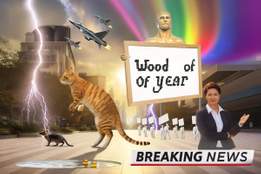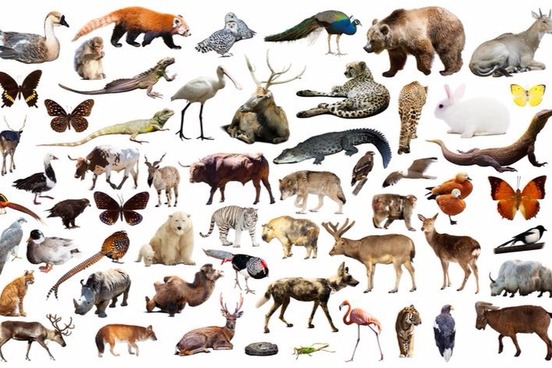
Animal
Biologically, of course, human beings are animals. The definition of human uses the term mammal; the definition of mammal uses vertebrate; the definition of vertebrate finally identifies the organism as an “animal.” (Sometimes definitions are like Russian dolls, uncovering ever-more specific classification with each successive cross-reference.) Outside of this basic definition, the use of the word animal as a metaphor referring to people and their characters or characteristics has a long history in the language. This use traces back to the time of Shakespeare, and, indeed, Shakespeare’s use of animal shows the range its use. Sometimes, people are identified as occupying the highest position in the hierarchy of the genus:
What a piece of work is a man! how noble in reason! how infinite in
faculties! in form and moving how express and admirable! in
action how like an angel! in apprehension how like a god!
the beauty of the world, the paragon of animals!
— Shakespeare, Hamlet, II, 2
Sometimes, people are identified as not superior to other animals but just one species among others:
Is man no more than this? Consider him well.
Thou ow'st the worm no silk, the beast
no hide, the sheep no wool, the cat no perfume. Ha! Here's three
on's are sophisticated! Thou art the thing itself;
unaccommodated man is no more but such a poor, bare, forked
animal as thou art.
— Shakespeare, King Lear,III, 4
And at other times, animal is used to indicate that a person is somehow less than human, usually in intelligence:
Sir, he hath never fed of the dainties that are bred
in a book; he hath not eat paper, as it were; he
hath not drunk ink: his intellect is not
replenished; he is only an animal, only sensible in
the duller parts
— Shakespeare, Love's Labour's Lost, IV, 2
Samuel Johnson’s dictionary of 1755 included this figurative meaning of animal (and Noah Webster included it in his dictionary of 1828):
By way of contempt, we say of a stupid man, that his is a stupid animal.
A finer distinction has subsequently been made by dictionaries, as shown in this definition from the 1934 edition of Merriam-Webster’s Unabridged:
: Pertaining to the sentient part of a creature, as distinguished from the intellectual, rational, or spiritual. “Our animal appetites and daily wants.” Wordsworth
This use was embodied in the character of the Muppet drummer named Animal.
Animal anthropomorphism of a non-derogatory sort goes back at least to political animal, which has been in the language since the early 1700s. A more neutral reference to the division between the intellectual and physical side of human beings is the term animal magnetism, which also dates to the 1700s.
Let’s take a look at some of those colorful words that can turn humdrum writers into party animals. (Party animal, by the way, was first used by Bill Murray in a Saturday Night Live sketch from 1977, according to the Oxford English Dictionary.)
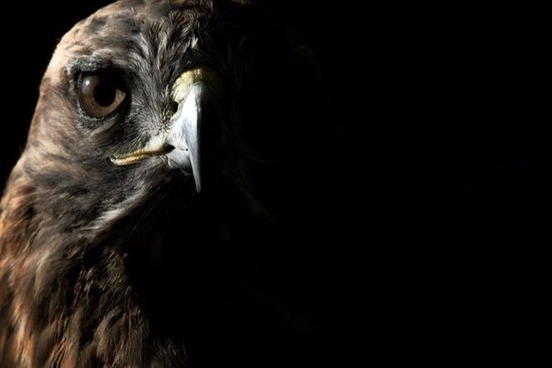
Hawk
Hawk and hawkish have two distinct anthropomorphic uses in English: as a description of appearance and as a description of attitude. The ancient art of falconry was reserved for nobility, and the aggressive behavior of the birds of prey became a metaphor for warlike actions and attitudes among people. Falcon and hawk are often synonymous, and the verb to hawk, meaning “to hunt birds by means of a trained hawk” was used in the late Middle Ages, which led to the word’s use meaning “to strike like a hawk.”
Shakespeare brings the use of the word to a war context in the words he gives to the French prince eagerly awaiting dawn and battle with Henry V. In these lines, hawk is still just a metaphor, but the context is very close to its modern use:
When I bestride him, I soar, I am a hawk: he trots the air;
the earth sings when he touches it; the basest horn of his
hoof is more musical than the pipe of Hermes.
— Shakespeare, Henry V, III, 7
It took a while for use of hawk and hawkish to refer to people who are supporters of war or warlike policy, but the term became widespread in the 1960s:
Rostow is distrusted by many for his hawkish attitudes and derided even within the Administration as an expounder of outspoken and endless optimism to a President who craves good news.
— “The Hawk-Eyed Optimist, TIME, 15 January 1966Two-thirds of the people of this province were of French descent and, in the minds of British officials as well as the American war hawks, their willingness to fight for their British king was an uncertain quantity.
— Harry L. Coles, The War of 1812, 1965
Chickenhawk is now used disparagingly to mean “a person who strongly supports or promotes a war or warlike policies but who has never served in the military.”
Hawkish was used much earlier to refer to a man’s appearance, usually with the meaning “hawked nose”:
Count of Bussy, major general of the light horse, had great sweet eyes, a handsome mouth, a something hawkish nose, an open face, and a happy Phisiognomy.
— Roger de Rabutin, Loves empire, or, The amours of the French court, 1682
A little-known term for a male hawk is tiercel (pronounced \TEER-suhl\), from the Latin word meaning “third,” possibly because the male hawk is one-third smaller than the female.

Dove
The peace-loving word that corresponds to the warmongering hawk is dove, defined as “an opponent of war.”
In the Bible, the dove brought news that the flood was receding to Noah on the Ark:
And the dove came in to him in the evening; and, lo, in her mouth was an olive leaf pluckt off: so Noah knew that the waters were abated from off the earth.
— Genesis 8:11
This image of the dove and the olive branch indicating safety, relief, and comfort also made it a symbol of peace. The use of dove and dovish in contrast with hawk started during the 1960s in the context of the war in Vietnam:
A “hard-line” strategist at the outset, he was considered vaguely dovish by the time he framed Rockefeller’s campaign proposals on Vietnam.
— Garry Will, Nixon Agonistes, 1970
Dove used as a term of endearment in English, usually referring to a child or a woman, goes back to the early 1600s.
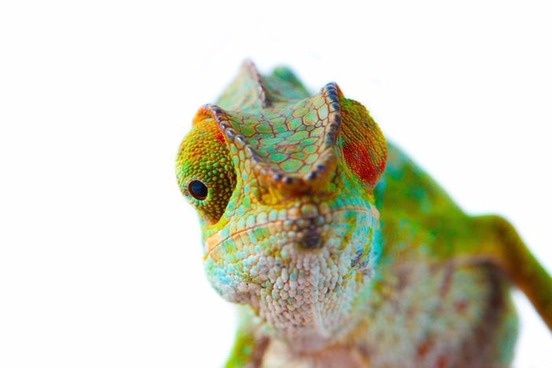
Lounge lizard
The term lounge lizard has dictionary definitions that describe an idle man who spends more time socializing that he perhaps should. “Fop” and “social parasite” are not ways that people generally choose to describe themselves. Indeed, the early uses of lounge lizard show that it was viewed as less than a respectable identity.
”Why I think it is wonderful in spite of all your disdain” he persisted. “That girl is not pretty yet she made all sorts of men, old and young, married and single, lounge lizards and athletes think she was the brightest girl in the lot.”
— Roe Fulkerson, The News Journal (Wilmington, DE), 11 Oct. 1916The "Tango lizard" and "the lounge lizard," and the idle girl of society, all these are disappearing in the nobler manhood and womanhood which has come to them. And it is giving a new vision to the rest of us. Those whom we used to despise because of their vanity, folly and sloth, we now admire because of the nobility which has come to them.
— The Guardian of Liberty, July 1917Dr. John Roach Straton of Manhattan, got his Board of Trustees to consider the erection of a new church seating 5,000 people, surmounted by a 20-story hotel for "good people," where "the painted woman and the lounge lizard" will not "reign supreme."
— TIME, 4 February 1924
When lounge lizard was first used one hundred years ago, it didn’t refer to a singer in a bar. That subsequent meaning—not yet recorded in dictionaries—derives from cocktail lounge, and retro lounge music (presumably with performers wearing lounge suits) usually evokes the Vegas of the 1950s and 1960s.
But Shakespeare's verse is easily deflated. Yes, we want natural engagement with its sense, and no, we don't need to have it crooned at us as if it were written for lounge lizards.
— Jesse Green, The New York Times, 29 September 2017
Different connotations for different times. That’s how some words can change in meaning.
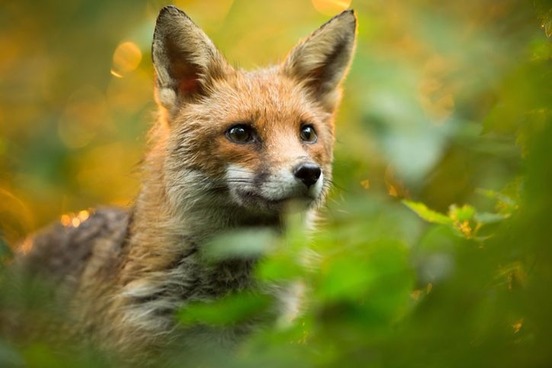
Fox
Fox is unusual because it has been anthropomorphized in English in two very distinct ways. The oldest, by far, is the use of fox to mean “a clever crafty person.” The Oxford English Dictionary records that this use is as old as the language itself, going back to the Old English of about 1000 A.D.
Use of the term in the 15th and 16th centuries make it plain that it was an important and frequent figurative meaning of the word:
the sly fox of Spain
the elders said he was a wily fox
these French are subtle foxes
Indeed, this metaphorical use of fox was so common that it was used in a bilingual dictionary translation in the famous Italian-English reference work by John Florio, A Worlde of Wordes, in 1598:
praticone, a suttle, old, practized, experienced, craftie foxe, a slie companion
Noah Webster used fox to illustrate his entry for metaphor in 1828:
In metaphor the similitude is contained in the name; a man is a fox, means, a man is as crafty as a fox.
Indeed, crafty as a fox was the preferred idiom until 1940, when crazy like a fox became more popular. Fox and outfox are also verbs meaning “to outwit” or “to outsmart.”
A very different meaning for fox arrived in the 20th century: “a good-looking young woman or man.” Foxy correspondingly added to “cunningly shrewd” the meaning “physically attractive.” Vixen, the word for a female fox, has been used with the meanings “an ill-tempered woman” and “an attractive woman.” While fox and foxy are mostly used with reference to women, silver fox is used mostly with reference to men with the meaning “an attractive middle-aged man having mostly gray or white hair.”
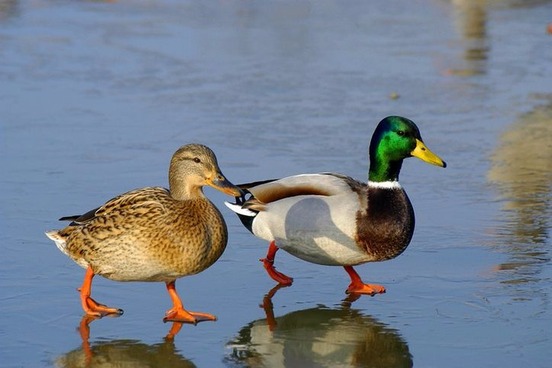
Duck
Duck has been a term of endearment for a person in British English since at least Shakespeare’s time, used as an equivalent of “darling.” Noah Webster defined it as “a word of endearment or fondness” in 1828.
However, duck has also been used to refer to people in less-than-endearing ways as well. Odd duck meaning “a strange person” goes back to the early 1900s:
He’s an odd duck, snooping round with fishermen when he isn’t reading Hebrew, and picking up gossip about the run of lobsters and the affairs of the artists in the Cove.
— Everybody’s Magazine, New York, 1911
Lame duck originally referred to a failing company or businessman:
The declaration stated that the plaintiff was a dealer in the funds, and that the defendant said of him, "He is a lame duck," meaning that he was incapable of fulfilling his contracts.
— John William Smith, A selection of leading cases, on various branches of the law, Philadelphia, 1855
It then was applied to politicians whose term of office would soon end:
…this court was made a sort of retreat for lame duck politicians that got wounded and had to retreat from the face of popular condemnation.
— The Congressional Globe, Volume 54, 12 January 1863
Dead duck, meaning “one that is doomed,” dates to the mid-1940s.
Rhyming reduplication made the playful term lucky duck a part of our language, dating back to the early 1900s:
Success is what railroad managers want, and if we use our efforts and try to profit from others’ experience, we will have pull, all of us. Again, you hear, “He is a lucky duck.”
— Locomotive Engineers Journal, Volume 39, 1905
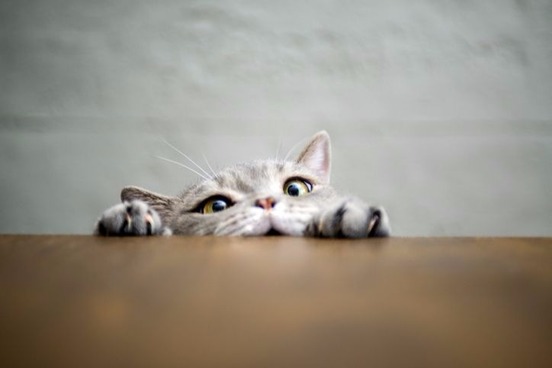
Cat
Cat is an animal that has had multiple lives—figuratively speaking—as a term referring to people in English. The Oxford English Dictionary records that cat had been used as “a term of contempt for a human being” since the 13th century. Catty meaning “slyly spiteful” or “malicious” (as in “a catty remark”) dates to the late 1800s. Early in the 20th century, fat cat came to be used to refer to a wealthy person or a big shot:
It used to be that Fat Cats of the business world, the great industrialists and bankers, the railroad executives and “big butter and egg men,” really trembled in their shoes while congress was in session.
— The World-Herald (Omaha, NE), 18 Dec. 1925
In jazz slang, cat and hepcat refer to a player or knowledgeable devotee of the music. This use broadened to make cat essentially a synonym of guy:
After a few sessions sitting in with the cats, Pops’ll swing out again, never fear.
— Hot News, Apr. 1935Tho' not a first class musician himself, Jimmy is a fine guy personally and surrounds himself with “hep” cats.
— Downbeat, Aug., 1937
The opposite of jazzy cool is expressed with the terms scaredy-cat and fraidy-cat, both developed in American English in the first decades of the 20th century. Scaredy-cat probably became much more well known following the 1947 Warner Bros. Merrie Melodies cartoon starring Porky Pig and Sylvester the Cat entitled Scaredy Cat.
Though cats may be easily frightened, other feline qualities have been associated with people as well: the agile and silent cat burglar, the attractive sex kitten, and the savage and quick-tempered wildcat.
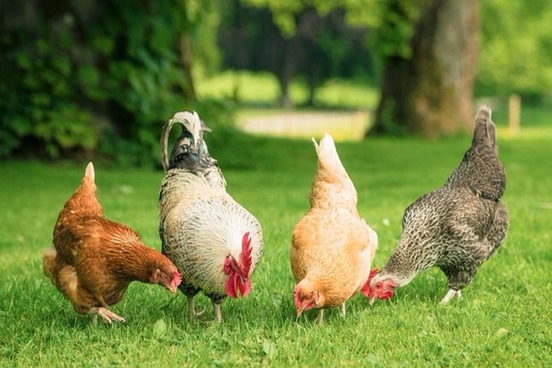
Chicken
Probably no name for an animal has a broader range of meanings when applied to people as does chicken. The word itself is as old as English, with over 1000 years of use referring to domestic fowl. One key to the word’s development is that it refers to the young of some birds as well—which presumably led to its use referring to young people: the Oxford English Dictionary shows that chicken meaning “child” was used in the King Arthur romances of the 15th century. Shakespeare uses it this way in Macbeth, when Macduff is told the horrible news of the murder of his family:
He has no children. All my pretty ones?
Did you say all? O hell-kite! All?
What, all my pretty chickens and their dam
At one fell swoop?
Samuel Johnson’s dictionary records chicken meaning “child” in 1755, and both he and Noah Webster note that the word is used in this way in the context of tender affection. Chicken became a term of endearment, like darling, and dove was used in this way also, as in “welcome, my dove,” or “why do you ask, my chicken?”
But the word grew up over time and came to mean “a young person” and especially “a young woman” in addition to “a child,” a meaning that is preserved in contemporary usage in the phrase “no spring chicken.”
The use of chicken to mean “coward” appeared later, beginning around 1600. Chicken is used as both as a noun (“don’t be a chicken”) and an adjective (“we were too chicken to try it”), and chickenhearted is also used to mean “cowardly,” a use that goes back nearly as far:
What chicken-hearted rogues are these to be cow'd with one misfortune!
— Thomas Killigrew, Comedies and Tragedies, 1664
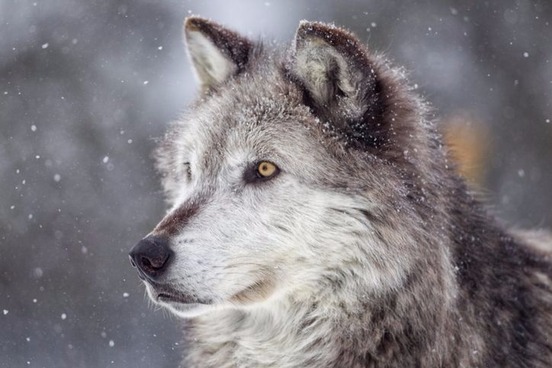
Wolf
Wolf has been used anthropomorphically to refer to both the hunter and the hunted. Going back to the Middle Ages, wolf was used to mean “a fierce, rapacious, or destructive person.” This meaning lives on in the expression “a wolf in sheep’s clothing,” referring to a person who appears to be friendly or helpful but who is really dangerous or dishonest. Another figurative meaning for wolf derived from the fact that real wolves were predators that were dangerous to livestock and would be hunted by people. This led to wolf being used to symbolize the prey rather than the predator, as in Shakespeare’s Henry VI, Part III, a play that uses “wolf” and “ravenous wolf” as simile and metaphor, such as these words from the evil character of Richard III:
Nay Warwick, single out some other chase;
For I myself will hunt this wolf to death.
Wolf is also the rare animal name that is also a verb in English, meaning “to eat (something) very quickly.”
Much later, beginning in the mid-1800s, wolf began to be used to mean “a forward and aggressive man” in the context of romantic or sexual relationships. The sheet music of the call-and-response song “Baby, It’s Cold Outside” doesn’t label the singers as “man” and “woman” but as “wolf” and "mouse,” terms that were more current in mid-20th century informal language than they are today (mouse had a definition of “woman or girlfriend” (labeled slang) in addition to “a timid person” in the 1961 edition of Merriam-Webster’s Unabridged dictionary).
